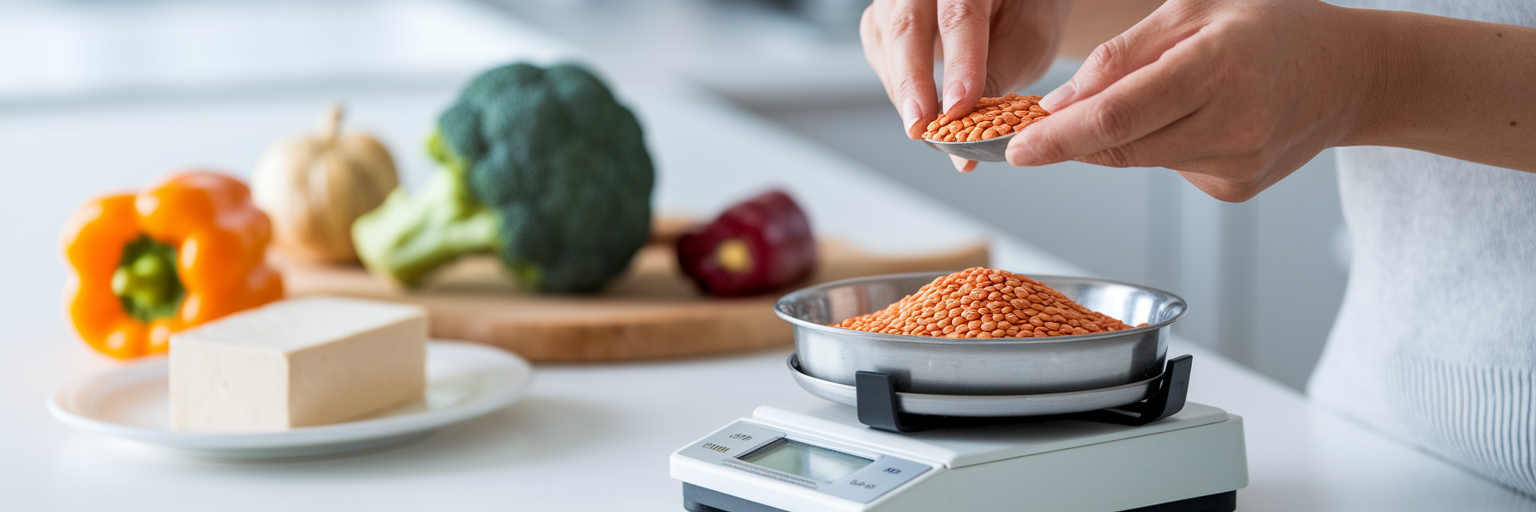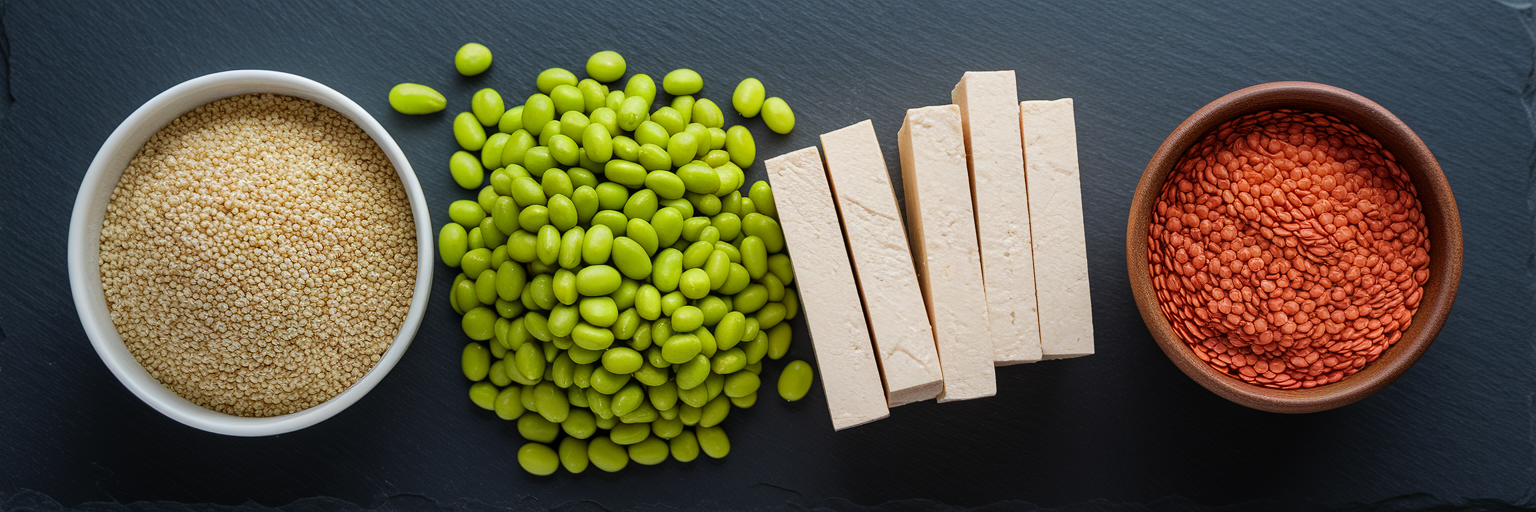Foundations of Vegan Body Recomposition
Let's address a persistent myth from the start: the idea that serious plant based muscle building is somehow harder or less effective. This notion is simply outdated. In fact, a 2025 study highlighted by ScienceDaily found no significant difference in muscle growth between individuals on vegan and omnivorous diets who followed a consistent weight training program. The evidence is clear. A well structured vegan diet provides everything your body needs to get stronger.
The goal for many is what we call body recomposition, which means building lean muscle while simultaneously reducing body fat. This isn't a fitness fantasy. It's an achievable outcome rooted in straightforward science. Protein provides the essential amino acids, the very building blocks your body uses to repair and grow muscle tissue after a workout. At the same time, maintaining a slight calorie deficit encourages your body to tap into its stored fat for energy. This section establishes the foundation. The following sections will show you exactly how to put these principles into practice.
Calculating Your Protein and Calorie Targets

Success in fitness often comes down to having a clear plan. Instead of guessing, let's define your targets with numbers. For active individuals focused on vegan protein for muscle gain, the scientific consensus points to an intake of 1.6 to 2.2 grams of protein per kilogram of body weight. To find your personal target, simply multiply your weight in kilograms by a number in this range. For example, a 70 kg person would aim for 112 to 154 grams of protein daily.
Next, let's address how to lose fat on a vegan diet without sacrificing muscle. The key is a moderate and sustainable calorie deficit, typically 200 to 400 calories below your daily maintenance level. Drastic calorie cuts can backfire, causing your body to break down muscle tissue for energy, which is the opposite of what we want. The focus should always be on nutrient density. Hitting your protein and calorie goals with whole foods like legumes, tofu, and vegetables will keep you feeling full and properly nourished. For those with busy schedules, incorporating a clean, plant-based supplement like our chocolate vegan protein powder can make hitting your daily number much simpler.
| Body Weight | Daily Protein Goal (grams) | Target Daily Calories (for fat loss) |
|---|---|---|
| 60 kg (132 lbs) | 96g – 132g | ~1700 – 1900 kcal |
| 70 kg (154 lbs) | 112g – 154g | ~1900 – 2100 kcal |
| 80 kg (176 lbs) | 128g – 176g | ~2100 – 2300 kcal |
| 90 kg (198 lbs) | 144g – 198g | ~2300 – 2500 kcal |
Note: Calorie targets are estimates based on a moderate activity level and a 300-calorie deficit. Individual needs will vary based on age, sex, and activity. Use this as a starting point and adjust as needed.
Strategic Protein Timing for Optimal Results
Now that you know how much protein you need, let's focus on when to consume it. Proper vegan meal timing can significantly enhance your body's ability to recover and build muscle. It’s not just about hitting a daily total. It’s about providing your muscles with a steady supply of amino acids when they need them most. Think of it as giving your body the right tools at the right time. Here are three key strategies to implement:
- The Post-Workout Window: After a strength training session, your muscles are primed for repair. Consuming 20 to 30 grams of high-quality protein within 30 to 60 minutes post-workout helps maximize muscle protein synthesis, the process that drives growth. This is the most critical time to refuel.
- Even Distribution: Instead of consuming most of your protein in one large meal, aim to spread your intake evenly across three or four meals throughout the day. This approach ensures a constant supply of amino acids to your muscles, supporting continuous repair and preventing muscle breakdown. Planning meals that hit your protein goals is easier than you think, and you can find inspiration in these 3 easy vegan protein recipes.
- The Pre-Sleep Snack: While not as critical as the post-workout window, a small, protein-rich snack before bed can be beneficial. A slow-digesting protein source can help reduce muscle breakdown overnight and support recovery while you sleep, ensuring you wake up ready for your next session.
Choosing High-Quality Vegan Protein Sources

A successful vegan fitness journey is built on a well-stocked pantry. Knowing the best vegan protein sources makes meal planning simple and effective. The goal is variety, as different plant foods offer different amino acid profiles. Combining them ensures you get a "complete protein" with all nine essential amino acids your body cannot produce on its own.
Here are some excellent sources to build your meals around:
- Legumes: Lentils, chickpeas, black beans, and peas are affordable, versatile, and packed with protein and fiber.
- Soy Products: Tofu, tempeh, and edamame are complete protein sources that are incredibly adaptable in the kitchen.
- Grains & Seeds: Quinoa, seitan, hemp seeds, and pumpkin seeds offer a substantial protein boost to any meal.
While whole foods should always be the foundation of your diet, life gets busy. A high-quality vegan protein powder can be an invaluable tool for convenience and precision, especially for hitting that post-workout window. Simple meal pairings, like a tofu scramble with a side of black beans or a quinoa bowl topped with pumpkin seeds, are easy ways to create complete protein meals that fuel your progress.
Avoiding Common Pitfalls in Vegan Diets
Building a strong, lean physique on a plant-based diet is straightforward, but a few common missteps can slow your progress. Being aware of these pitfalls is the first step to avoiding them and ensuring your vegan bodybuilding diet plan is effective. The goal is to create a diet defined by nutrient-dense whole foods, not just the absence of animal products.
Here are a few things to watch out for:
- Inadequate Amino Acid Profile: Not all plant proteins are created equal. It's important to get enough of key amino acids like leucine and lysine, which are crucial for muscle synthesis. Prioritize sources like soy, lentils, and quinoa. This is critical, as a 2025 study reported by the Economic Times warned that some long-term vegans risk muscle issues due to deficiencies. Choosing from the best protein powders ensures you receive a complete amino acid profile designed for muscle support.
- The 'Junk Food Vegan' Trap: Many processed vegan foods, like cookies, chips, and mock meats, can be high in calories, sodium, and unhealthy fats while offering little nutritional value. Over-relying on these can undermine your efforts to lose fat on a vegan diet.
- Micronutrient Gaps: Pay attention to key micronutrients that can be less abundant in plant-based diets, such as vitamin B12, iron, and vitamin D. Incorporate fortified foods or consider targeted supplementation to cover your bases.
Pairing Nutrition with Effective Strength Training
You can have the most perfectly calculated nutrition plan, but it's only one half of the equation. Your diet provides the building blocks, but strength training provides the stimulus for muscle growth. Without a consistent and challenging workout routine, that protein has nowhere to go. The synergy between what you eat and how you train is what ultimately drives results.
The core principle of effective training is progressive overload. In simple terms, this means continually challenging your muscles by gradually increasing the weight you lift, the number of repetitions you perform, or the overall intensity of your workouts. This consistent demand forces your muscles to adapt, repair, and grow stronger. Combining this training stimulus with the high-quality vegan protein and strategic calorie intake we've discussed is the definitive path to achieving your goals. For more tips on fitness, nutrition, and living a strong, plant-powered life, explore our blog.



